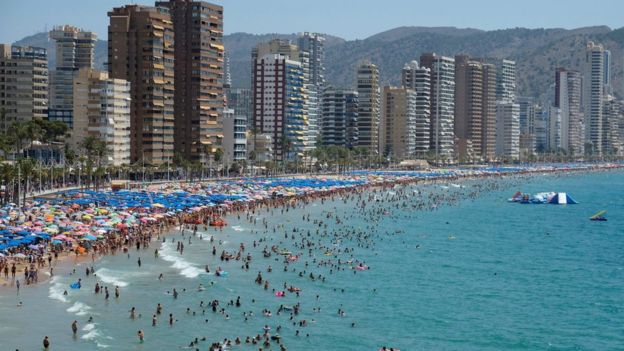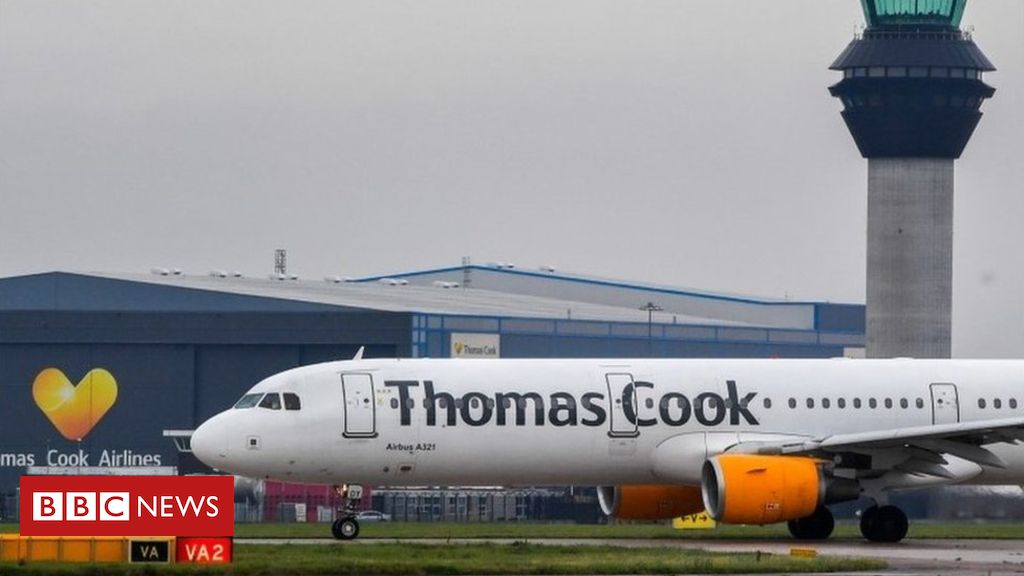Thomas Cook collapses as last-ditch rescue talks fail
Thomas Cook has collapsed after last-minute negotiations aimed at saving the 178-year-old holiday firm failed.
The UK Civil Aviation Authority (CAA) said the tour operator has “ceased trading with immediate effect”.
It has also triggered the biggest ever peacetime repatriation aimed at bringing more than 150,000 British holidaymakers home.
Peter Fankhauser, Thomas Cook’s chief executive, said the firm’s collapse was a “matter of profound regret”.
Commenting as the company entered compulsory liquidation, Mr Fankhauser also apologised to the firm’s “millions of customers, and thousands of employees”.
The tour operator’s failure puts 22,000 jobs at risk worldwide, including 9,000 in the UK.
Transport Secretary Grant Shapps said the company’s collapse was “very sad news for staff and holidaymakers”.
He urged holidaymakers to be “understanding with staff” amid the “enormous” task of bringing people home.
Mr Shapps has announced that the government and CAA has hired dozens of charter planes to fly customers home free of charge.
The emergency operation, codenamed Operation Matterhorn, is aiming to bring home Britons currently on holiday with the firm.
On Sunday, empty aircraft had already started to be flown overseas, ready to bring British tourists home on Monday.
One of the world’s best known holiday brands, the business was founded in 1841 in Leicestershire by cabinet-maker Thomas Cook.
How will holidaymakers get home?
All customers currently abroad with Thomas Cook who are booked to return to the UK over the next two weeks will be brought home “as close as possible” to their booked return date, the Department for Transport (DfT) has said.
Customers will be brought home to the UK on special free flights or booked onto another scheduled airline at no extra cost.
Flights will start operating from Monday, with details of each flight to be posted on a dedicated website as soon as they are available.
The DfT added that a “small number” of passengers may need to book their own flight home and reclaim the costs.
Customers have been urged not to cut short their holiday or go to the airport without checking the website for more information about their return journey.
The CAA is also contacting hotels accommodating Thomas Cook customers, who have booked as part of a package, to tell them that the cost of their accommodation will be covered by the government, through the Air Travel Trust Fund and Air Travel Organiser’s Licence scheme (Atol).
The CAA said in a statement: “All Thomas Cook bookings, including flights and holidays, have now been cancelled.
“We know that a company with such long-standing history ceasing trading will be very distressing for its customers and employees and our thoughts are with everyone affected by this news.”
Tim Johnson, policy director of the CAA, told BBC News it has chartered “more than 40” aircraft, which are already in position, to bring passengers home.
He urged customers in the UK who were due to travel not to go to the airport “because very sadly your flight has been cancelled”.
Mr Johnson added: “For those who have not yet started their holiday, we will be publishing details of how they can claim a refund on the website, no later than next Monday.”
Business Secretary Andrea Leadsom has said she will write to the Insolvency Service urging them to “fast-track” their investigation into the circumstances surrounding Thomas Cook going into liquidation.
The DfT said the investigation will also consider the conduct of the directors.
Travel expert Simon Calder told BBC News that planes at Manchester airport have already begun to be impounded following news of the collapse.
“Shortly after midnight, we saw the airport putting a notice of detention on some Thomas Cook aircraft because of unpaid airport bills,” he said.
What went wrong?
Thomas Cook had secured a £900m rescue deal led by its largest shareholder Chinese firm Fosun in August, but a recent demand from its lending banks to raise a further £200m in contingency funding had put the deal in doubt.
Fosun said in a statement it was “disappointed” following news of the collapse.
It added: “Fosun confirms that its position remained unchanged throughout the process, but unfortunately other factors have changed.
“We extend our deepest sympathy to all those affected by this outcome.”
The holiday company had spent all Sunday in talks with lenders trying to secure the additional funding and salvage the deal, but to no avail.
It had also asked the government for financial aid, a solution also urged by Labour and union groups.
But on Sunday Foreign Secretary Dominic Raab told the BBC the government did not “systematically step in” when businesses went under unless there was “a good strategic national interest”.
Customers on a package holiday have Atol protection – a fund paid for through industry levies – which will cover the cost of their holiday and repatriation.
Thomas Cook has blamed a series of issues for its problems including political unrest in holiday destinations such as Turkey, last summer’s prolonged heatwave and customers delaying booking holidays because of Brexit.
But the firm has also faced fierce competition from online travel agents and low-cost airlines.
In addition, many holidaymakers are putting together their own holidays and not using travel agents.
What are your rights?

If you are on a package holiday you are covered by the Atol scheme.
The scheme will pay for your accommodation abroad, although you may have to move to a different hotel or apartment.
Atol will also pay to have you brought home if the airline is no longer operating.
If you have holiday booked in the future you will also be refunded by the scheme.
If you have booked a flight-only deal you will need to apply to your travel insurance company or credit card and debit card provider to seek a refund.
When Monarch Airlines collapsed in 2017, the government organised to bring home all the stranded passengers, whether they were covered by Atol or not.




